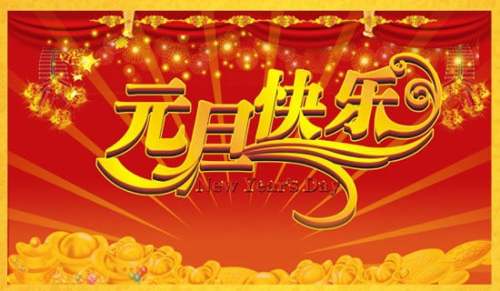元旦的习俗英文介绍
从古代殷朝汉朝一直到民国,然后到新中国成立,元旦节的演变是一个很长的历史过程。下面小编给大家整理的关于元旦节的'习俗英语介绍,欢迎大家参考!

元旦的习俗英文介绍 1
1. Kaisui(beginning of the year): According to the Chinese traditional custom, starting from haishi(9p.m. to 11p.m.)of the last evening of the twelfth lunar month, each family must prepare offering s to deities at the altar. At the same time, they too prepare food for the New Year day: The whole family will then stay awake together to attend to the year(called shou sui).
After haishi, zishi(11p.m. to 1a.m.)will come, and this is the arrival of New Year(Yuandan). At this moment, people begin the celebration with fireworks. Vegetarian and sweet foods will then be placed are the altar for offerings, and incense be burned to welcome the deities.
In the ancient times, it was believed that haishi connected the two years and thus was called kaisui.
At the same night, some families will follow the instruction in Tongshu and place preparing altar in the direction of the "fortune deity" during the "fortune time" to receive the deity.
If the direction of the "fortune deity" is at the "ill position", people will choose to receive "happy deity" or "noble deity" instead.
2. There is an apparent difference in the custom of food taking on Yuandan between the Chinese in the northern and southern regions. The northern Chinese has the habit of taking jiao zi(dumpling made of flour with vegetable and meat wrapped inside). Some people may put a sweet or a coin inside jiao zi, hoping to have a sweet year after tasting the sweet and a wealthy year after tasting the coin.
on the other hand, the southern Chinese have the taboo for killing on Yuandan. Therefore, they do not take meat in tee morning of Yuandan, so as to avoid bloodshed or mutual slaughter.
In order to evade misfortune, they have the first meal of this day without meat. Instead, they take vegetarian food for the sake of virtue.
3. What is special during the New Year is that parents or elders will distribute red packets(ang pao or ya sui qian)to the children.
People in the ancient times were more particular in giving away the red packets: the distribution took place on the eve of New Year so that the kids could suppress the past year and enter the New Year. Ya sui has the meaning of overcoming the unpredictable future.
Representing the wishes for the healthy psychological growth of the children, ya sui qian symbolises the elders hope to see their children overcome all the unpredictable elements brought by the "year".
4. There is an extraordinary number of taboos on Yuandan. Each place has its own customs of taboo. Here, we will mention only a few common taboos in Fujian Province, Guangdong Province and Southeast Asia:
In the past, people commonly believed that fortune was hidden in the house. So, wsweeping of floor must be done in the direction moving inwards, and there was no clearance of rubbish at night.
Particularly on the New Tear day, in order to keep fortune from flowing out, there was no sweeping. Some families kept this taboo until the fifth or even the fifteenth day.
If anything was broken, the pieces were wrapped up in order not to let the fortune slip away and were disposed only the fifth day.
Yuandan(in more serious families, the period extends from the 1st to the 15th day) marks the new beginning. In the hope that New Year brings good beginning, people should utter neither unkind words nor vulgar language.
Making noises, fighting, quarreling and especially weeping are avoided to deter misfortune. There are even taboos of taking medicine and having sneeze, for it is believed that they can lead to sickness throughout the year.
Taboos of the past also concerned the use of knife and the breaking of things. If a thing was broken, the word "break" or any other word importing similar meaning was not used. Instead, words like "failing to the floor and blossoming like flowers" which delivered pleasant senses were used to suggest good connections.
On Yuandan, neither lending and nor giving of money to others is done so that there will be no out-flowing of money during the year.
There is also the saying that if a male sleeps in the afternoon, his career will breakdown, and if a female has an afternoon nap, the kitchen will collapse.
元旦的习俗英文介绍 2
1、元旦的英文介绍
New Years Day is the first day of the lunar calendar.it is the day when the earth has circled the sun for one round and is beginning another circling.it represents a new beginning when people send off the old days and welcome the new ones.as the first day of the year, yuandan has been considered to be the most important festival since the ancient times.
2、元旦习俗
kaisui(beginning of the year):according to the chinese traditional custom,starting from haishi(9p.m.to 11p.m.)of the last evening of the twelfth lunar month,each family must prepare offering s to deities at the altar.
At the same time,they too prepare food for the new year day:the whole family will then stay awake together to attend to the year(called shou sui).after haishi,zishi(11p.m.to 1a.m.)will come,and this is the arrival of new year(yuandan).At this moment,people begin the celebration with fireworks.vegetarian and sweet foods will then be placed are the altar for offerings,and incense be burned to welcome the deities.In the ancient times,it was believed that haishi connected the two years and thus was called kaisui.